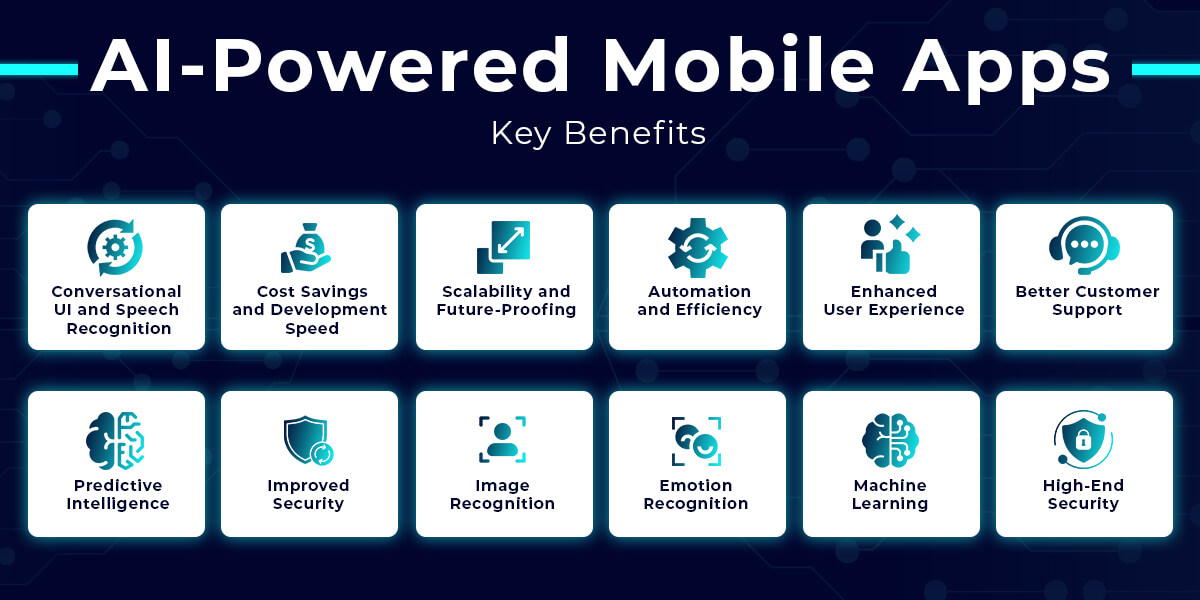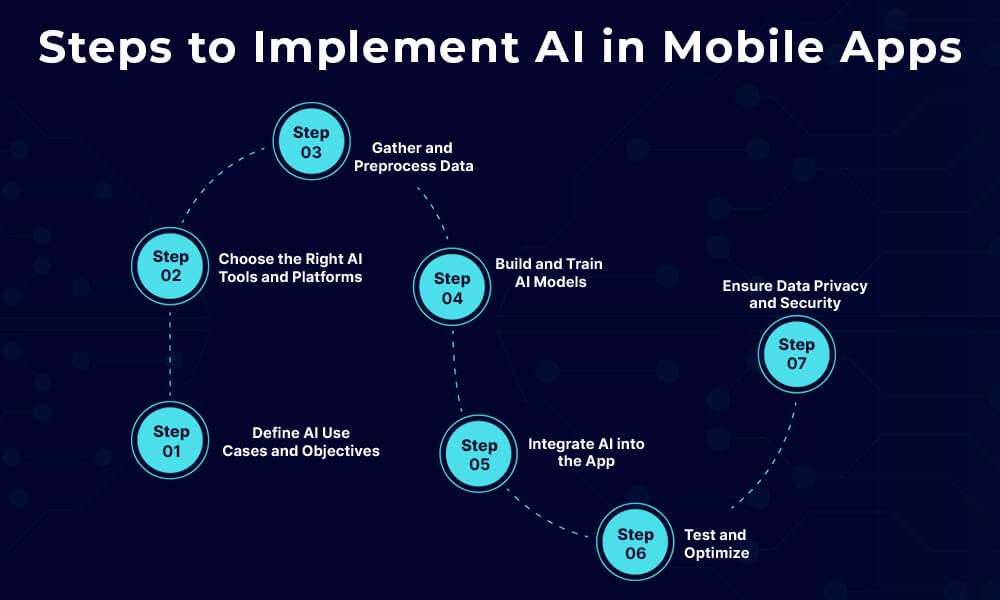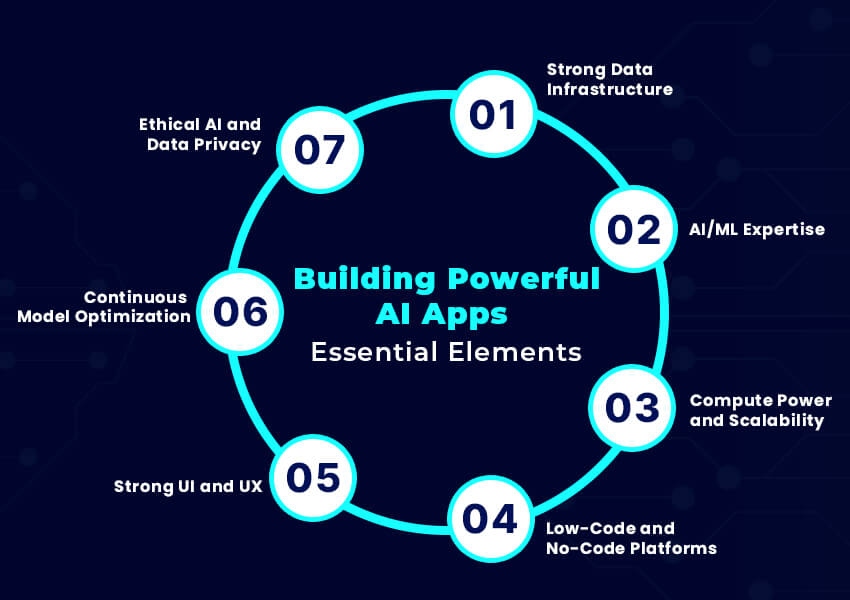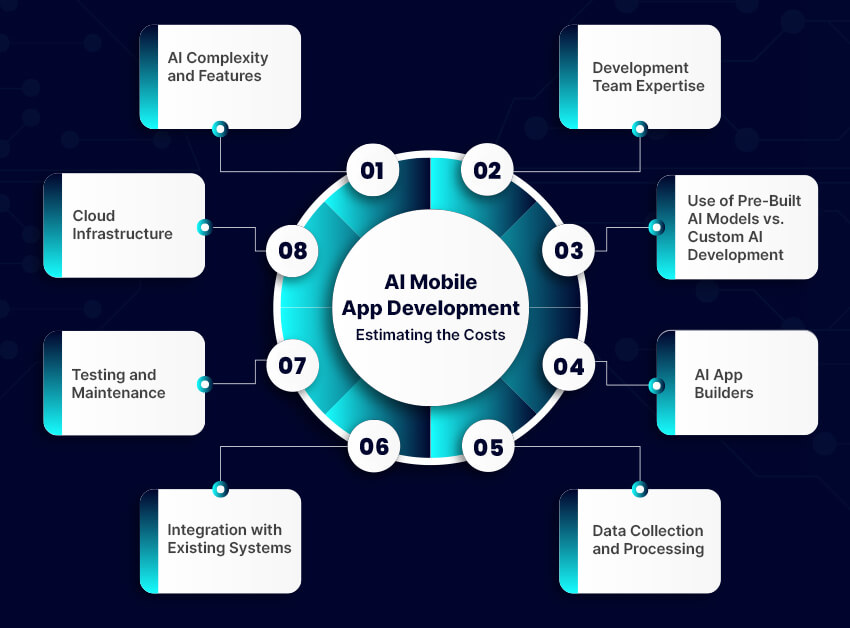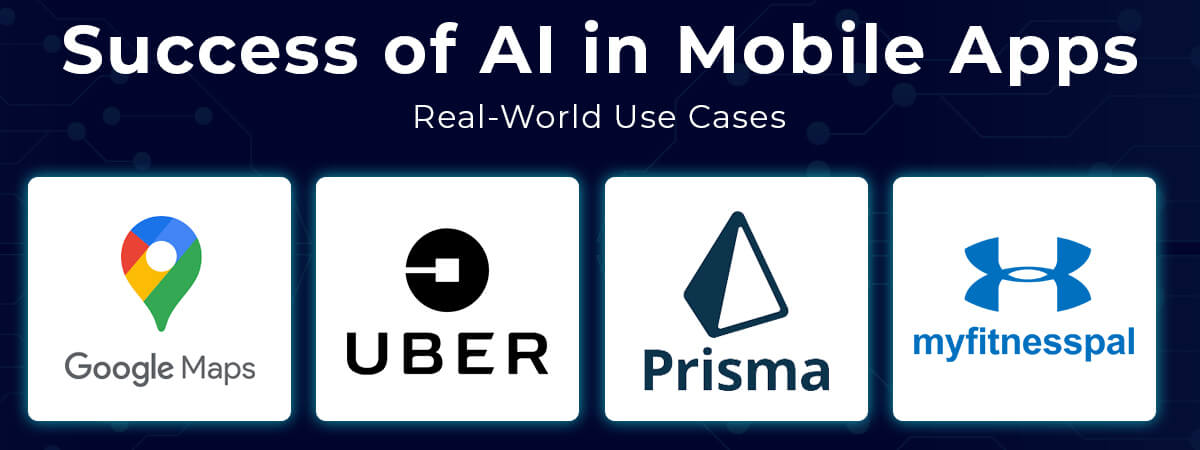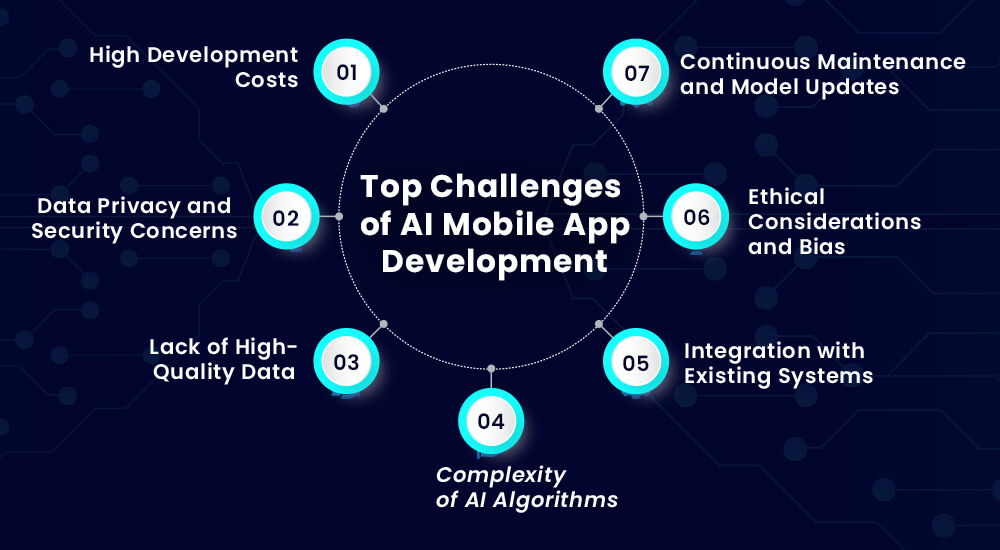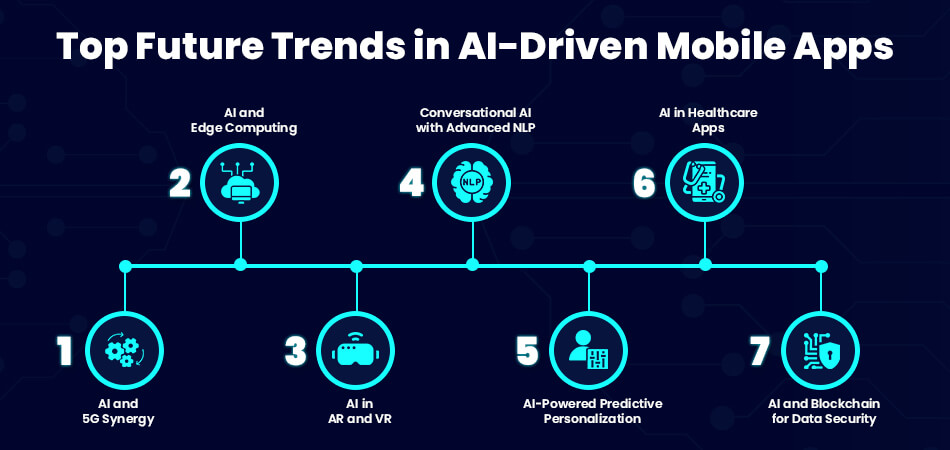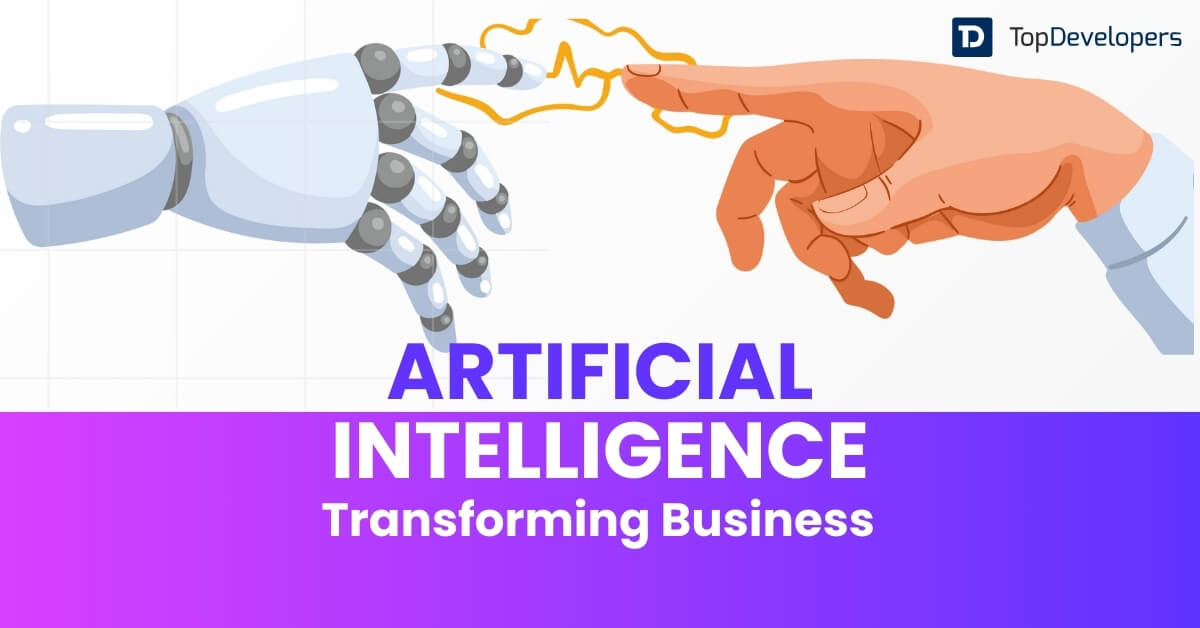
People using mobile apps are naturally including artificial intelligence. AI drives both the brief responses from a chatbot and the music app proposing the ideal playlist. It no longer reflects something futuristic. Already here, silently in the background, it makes programs seem smarter and more useful.
Previously, artificial intelligence was only found in advanced or experimental apps, but it is now becoming standard. Artificial intelligence enables apps to seem more natural and responsive. It can generate predictions, learn from user behavior, and present really personal experiences.
AI is becoming indispensable in mobile app development as expectations for flawless and sophisticated app experiences keep growing. Developers are creating apps that change and expand with every encounter using technologies such as natural language processing and machine learning.
In this article, you will find out how AI is transforming mobile apps nowadays. It encompasses major trends, realistic examples, real advantages, general issues, costs of development, and where this technology is going next.
Table of Contents
- What is AI in mobile app development?
- The Implications of Artificial Intelligence in the Mobile App Industry
- Current Stats of AI in the Mobile App Development Industry
- Benefits of Using AI in Mobile App Development
- Enhanced User Experience with Personalization
- Automation and Efficiency
- Improved Security
- Image Recognition
- Cost Savings and Development Speed
- Scalability and Future-Proofing
- Better Customer Support with Chatbots and Virtual Assistants
- Conversational UI and Speech Recognition
- Predictive Intelligence
- High-End Security
- Machine Learning
- Emotion Recognition
- How to Implement AI in Mobile Apps?
- What Does It Take to Build Powerful AI Apps?
- How Much Does It Cost to Develop AI Mobile Apps?
- Real-World Examples of AI in Mobile Apps
- Challenges of Implementing AI in Mobile App Development
- Future Trends in AI and Mobile Apps
What is AI in mobile app development?
Developing mobile apps with artificial intelligence is mostly about producing tools that can independently think, learn, and adapt. These applications employ machine learning and clever algorithms to make judgments, grow over time, and provide a more customized experience than merely following simple directions.
AI assists with chores typically requiring human intellect in mobile apps. This covers identifying trends in user behavior, foretelling future actions, problem-solving, and automated, minor but significant action completion.
AI aids several phases of app development in the following respects:
- Planning phase: AI tools assist in examining consumer behavior, preferences, and market trends. This helps app developers understand, before an app is even developed, what users could wish or expect from it.
- During the design phase, artificial intelligence can customize the user interface by utilizing real-time behavior. It can advise changes in design that simplify and increase enjoyment of the app.
- Artificial intelligence instruments greatly benefit the process of app creation during the development phase. Popular choices are platforms like TensorFlow and PyTorch since they enable machine learning activities and simplify the training of smart models. Apart from these, there are other AI-powered tools that can propose better code, identify minor mistakes early on, and manage sometimes time-consuming repetitious tasks. This frees developers from everyday chores so they may concentrate more on the creative aspects of app development.
The Implications of Artificial Intelligence in the Mobile App Industry
Artificial intelligence is significantly altering the world of mobile apps. It goes beyond only including clever features or task automation. It’s about designing apps that seem more natural, more useful, and more in line with consumers’ actual preferences.
Apps using artificial intelligence can learn from user behavior, create predictions, and instantly modify themselves. This leads to better personalization, more seamless experiences, and evolving features as users engage with the app more frequently. Knowing what their consumers need and providing improved solutions free from conjecture helps businesses as well.
Popular smartphone apps already utilize several of these AI technologies:
- Apps run by artificial intelligence voice assistants—like Google Assistant and Siri—let users search, create reminders, or send messages merely using their voice. It simplifies daily chores and is quick and hands-free.
- Chatbots: AI chatbots included in Facebook Messenger enable consumers to get quick responses inside apps. Tracking an order or posing a question—these bots operate around the clock to provide fast assistance without waiting.
- Image Recognition: AI is at work if you have ever used a fun filter on Snapchat that precisely matches your face. It can modify in real time, identify features, and detect faces. Beyond filters, this technology helps consumers organize images by identifying who is in them or log in securely.
Current Stats of AI in the Mobile App Development Industry
AI is redefining the foundation of mobile app design, use, and experience. From speedier customer service to better personalization, companies are putting artificial intelligence in their apps to stay ahead. Moreover, strong expansion, not merely a trend, supports this change.
-
AI Growth in Mobile App Development
Mobile apps’ fast-increasing demand for artificial intelligence is growing at a CAGR of 25.12%. Reports indicate that the worldwide market for artificial intelligence in mobile apps is predicted to reach $34.56 billion by 2028. Driven by the demand for automation and tailored user experiences, another study projects that artificial intelligence in mobile development will rise at over 31% CAGR by 2026.
It goes beyond just expansion. Artificial intelligence is increasingly becoming the focal point of modern smartphone apps. Now extensively applied across sectors are technologies such as predictive analytics, natural language processing (NLP), and machine learning.
- Healthcare: Apps monitor symptoms, provide virtual health aides, and customize treatment using artificial intelligence.
- e-Commerce: Companies employ artificial intelligence for consumer behavior insights and product recommendations.
- Finance: AI supports credit rating, financial planning, and fraud alerts as well as other aspects.
- Even startups are plunging right in. Applications in fitness, real estate, and mental health that start with artificial intelligence are increasingly sought after. For instance, MyFitnessPal generates customized exercise and diet recommendations using artificial intelligence.
-
Key AI Trends You Should Know
- Customer Support Gets Smart: 95% of customer interactions by 2025 are predicted to be handled by artificial intelligence.
- AI Software Industry Boom: Showing its increasing predominance in tech, the worldwide AI software industry is predicted to reach $126 billion by 2025.
- AI for User Engagement: More companies are leveraging customized capabilities of AI to grasp user behavior and hence increase engagement.
-
Where AI Is Making an Impact
Let’s examine many app categories’ use of artificial intelligence:
AI provides real-time health tracking, fitness routines, and nutrition recommendations depending on customer objectives.
- Finance: AI drives solutions for robot advisors, tracking investments, and even budgeting.
- Retail: AI provides custom product recommendations and helps stores forecast demands for inventories.
- As artificial intelligence develops, its importance in the creation of mobile apps will only get more apparent. Early adopters of it will set the standard for customer satisfaction, efficiency, and creative ability.
Benefits of Using AI in Mobile App Development
Including artificial intelligence (AI) in the creation of mobile apps presents a lot of advantages that greatly improve the development process as well as user experience. It is becoming a fundamental technology, offering different creative applications, increased capability, and user experience. Using AI-powered characteristics, including predictive analytics, natural language processing, and tailored suggestions, improves user involvement and pleasure. Here are some main advantages of applying artificial intelligence to the creation of mobile apps:
-
Enhanced User Experience with Personalization
The capacity of an artificial intelligence technology to tailor the user experience is among its main advantages of having an AI tool. By use of user behavior and preference analysis, AI-powered mobile apps can generate personalized content, recommendations, and interfaces. Apps like Netflix and Spotify, for example, employ AI algorithms to suggest shows and songs based on user viewing or listening. Higher retention rates follow from increased user engagement and pleasure brought about by this degree of customization.
-
Automation and Efficiency
AI automates repetitive operations, thereby enhancing the productivity of mobile apps. Two instances of artificial intelligence’s capacity to simplify user interactions are predictive typing and auto-correction found in messaging apps. AI-driven automation can streamline back-end operations, including data processing and content creation, therefore freeing developers to concentrate on more difficult and artistic elements of app development.
-
Improved Security
Improving app security relies critically on artificial intelligence. Mobile apps become far more secure thanks to AI-driven technologies such as voice identification, fingerprint authentication, and facial recognition. Apps like Apple Pay and Google Pay use AI-powered biometric authentication, for example, to guarantee privacy, data security, and safe transactions. AI also detects possible hazards in real time and finds trends in user behavior to notify app owners of dubious activities.
-
Image Recognition
Apps like Snapchat frequently feature AI-powered image recognition for facial identification and filter functions. Other programs, including Google Photos, utilize artificial intelligence to automatically classify photos and name items, people, or scenes. Security uses of this technology also enable things like facial authentication.
-
Cost Savings and Development Speed
By simplifying the mobile app development process, artificial intelligence lets creators create apps at less expense and faster speed. AI lowers the manual effort needed for repetitious operations by automating code recommendations and improving app performance. Low-code AI systems like Salesforce’s Einstein let developers include AI capabilities in their apps without having to deal with a lot of code, therefore shortening the app development time.
Tips to Reduce Mobile App Development Costs for Start-ups
-
Scalability and Future-Proofing
AI-driven apps aim to grow in tandem with user requirements. Because artificial intelligence can handle enormous volumes of data in real time, mobile apps become more responsive and capable of managing rising traffic. Furthermore, self-learning algorithms of artificial intelligence guarantee that programs can change and adapt to future user needs without depending on continuous updates.
-
Better Customer Support with Chatbots and Virtual Assistants
Virtual assistants and AI-driven chatbots give users fast responses to their questions around the clock, therefore offering flawless customer care. These AI-powered systems—like Facebook Messenger or WhatsApp’s AI chatbots—can answer many questions and provide individualized responses depending on past interactions and preferences. This reduces the need for human assistance agents, thereby saving companies money. Virtual assistants like Google Assistant and Siri further demonstrate artificial intelligence’s ability to grasp natural language and engage in human-like interactions.
-
Conversational UI and Speech Recognition
Conversational artificial intelligence has revolutionized mobile user interfaces. NLP helps apps recognize and respond to human speech, thereby enabling voice commands. Natural language processing (NLP) is used by apps such as Siri and Google Assistant to include consumers in human-like interactions, therefore enhancing the interactivity and accessibility of the app. Duolingo and other language learning apps have also included speech recognition technology, therefore transforming the interactive and intriguing learning process. This raises user happiness and increases app inclusiveness since users may interact by text or voice instructions.
-
Predictive Intelligence
Through predictive analytics, artificial intelligence’s capacity to forecast user behavior and preferences lets apps provide more pertinent content and tailored recommendations. For example, e-commerce sites like Amazon employ artificial intelligence to forecast consumer demands depending on past purchases, browsing behavior, and user interactions. By providing quick and pertinent product recommendations, this raises consumer involvement and improves conversion rates.
-
High-End Security
By seeing possible hazards in real time, pointing out flaws, and providing predictive analysis of cybersecurity risks, artificial intelligence guarantees premium protection. Features driven by artificial intelligence, including gesture control, biometric authentication, and facial recognition, help protect user information and guarantee safe transactions. One of the most important tools for app security is artificial intelligence’s capacity to constantly track dubious behavior in real time.
-
Machine Learning
One of artificial intelligence’s main subfields, machine learning (ML), lets apps grow and learn from data. Recommendation engines, fraud detection systems, and real-time translators all make extensive use of ML techniques. Popular instances include Google Translate, which offers instantaneous translations between languages, and YouTube’s recommendation system, which utilizes ML to propose pertinent films.
-
Emotion Recognition
The emotional state of the user is ascertained by AI’s emotion recognition technology by means of facial expressions, voice tone, and body language. In mental health apps especially, where AI can monitor users’ moods and offer real-time support, this is quite helpful. Using artificial intelligence, apps such as Wysa and Replika let users participate in sympathetic dialogues, therefore establishing understanding and encouragement.
How to Implement AI in Mobile Apps?
Such artificial intelligence in mobile apps might improve user experience and offer strong features such as real-time data processing, predictive analytics, and natural language processing. Including artificial intelligence, though, calls for meticulous preparation, technical knowledge, and appropriate infrastructure. Here is a detailed instruction on adding artificial intelligence into mobile apps.
Step 1: Define AI Use Cases and Objectives
Before delving into the technical details, note the particular issues AI may fix for your app. Clearly state the goals, whether they be strengthening app security with facial recognition, tailoring content recommendations, or improving customer support with chatbots. Depending on the demands of your app, you will have to choose whether artificial intelligence will concentrate on predictive analytics, automation, or personalization.
Step 2: Choose the Right AI Tools and Platforms
Implementing artificial intelligence depends on choosing the suitable tools and platforms. There exist various artificial intelligence and machine learning systems:
- TensorFlow and PyTorch: We extensively develop and implement AI models using the open-source frameworks TensorFlow and PyTorch.
- Google ML Kit: A mobile SDK with text recognition, facial identification, and image labeling easily implemented capabilities.
- IBM Watson: An powerful natural language processing and machine learning artificial intelligence platform
- Microsoft Azure AI and AWS AI: Cloud-based services providing predictive analytics, voice, and computer vision, among other AI capabilities.
Particularly for developers with less AI knowledge, each of these AI software platforms provides pre-built AI models and APIs that ease the integration process.
Step 3: Gather and Preprocess Data
AI models mostly depend on data. Your AI model will operate better the more accurate and complete your data is. First, gather and arrange the required information from databases, user accounts, and outside sources. For a recommendation engine, for instance, you will require user behavior data, including search queries, prior purchases, and browsing activity.
Cleaning, normalizing, and formatting the data for training an AI model depends on data preprocessing—a crucial first step. This procedure guarantees consistency over the data set, fills in missing values, and removes noise.
Step 4: Build and Train AI Models
Building AI models starts once your data is ready. The complexity of the work will determine whether you create custom models from scratch or use pre-trained models.
- Pre-trained models: Platforms like Google or IBM Watson will supply pre-trained models for typical use cases, including image recognition or speech processing.
- Custom models: Using frameworks like TensorFlow or PyTorch, you might have to build a fresh model from the start should your app call for special AI capability. For highly specific data or when the current models fall short of your needs, for example, custom artificial intelligence models are essential.
Even after development, it is crucial to train the model with the data you have acquired. Feeding the model data, modifying parameters, and assessing its performance until it generates accurate predictions constitute the training process.
Step 5: Integrate AI into the App
Integration of your AI model into your mobile app comes next once it is trained and optimized. This entails SDK or API embedding the AI model into the programming of the app. Google TensorFlow Lite, for instance, allows you to effectively execute machine learning models on Android or iOS devices.
Make sure the AI features of the app are smoothly included into its flow using a user-friendly interface. Whether it’s a recommendation engine, voice assistant, or chatbot, the AI-powered capabilities should improve the user experience generally without confusing things.
Step 6: Test and maximize
Making sure your artificial intelligence application performs as expected depends mostly on testing. Conduct performance testing to verify scalability and efficiency, as well as functional testing to ensure that the AI features execute their duties accurately. We must routinely update and adjust AI models as new data becomes available to ensure the app adapts to user behavior and demands.
Step 7: Ensure Data Privacy and Security
Data privacy and security are absolutely critical when dealing with artificial intelligence, particularly in fields like banking or healthcare. Please ensure that your AI model adheres to GDPR or CCPA regulations regarding data privacy. Use AI to track and identify any suspicious activities; apply robust encryption techniques for user data.
What Does It Take to Build Powerful AI Apps?
Constructing Strong AI Applications Fundamental Components
Creating strong AI-driven mobile apps calls for a holistic approach that takes infrastructure, data, resources, and continuous maintenance into account rather than only technical knowledge. Important elements below help to create a strong artificial intelligence app.
-
Strong Data Infrastructure
The fuel running artificial intelligence is data. Training machine learning models and raising AI capabilities depend on both structured and unstructured data of high quality. A strong data architecture guarantees that the app may effectively, in real time, handle big amounts of data to generate correct forecasts and recommendations. To provide customized services, AI-powered apps like Google Maps and Amazon make enormous use of location data and user activity patterns.
Invest in a scalable data storage system (such as data lakes or cloud-based solutions like AWS or Google Cloud) equipped to manage and analyze both structured and unstructured data in real time.
-
AI/ML Expertise
Creating an artificial intelligence mobile app calls for a team of talented data scientists, machine learning engineers, and app developers adept in artificial intelligence algorithms, data science, and app development. These professionals have to be knowledgeable in artificial intelligence models, including TensorFlow, Keras, and PyTorch, and tools for natural language processing (NLP) such as Hugging Face or spaCy. For instance, Uber constantly improves ride allocation algorithms depending on customer data using AI and machine learning experts.
The main lesson is that a multidisciplinary team with knowledge in machine learning, natural language processing, and app development is necessary to create a strong AI application.
-
Compute Power and Scalability
Particularly those using deep learning or large-scale machine learning models, artificial intelligence apps call for substantial processing resources. To manage the training and inference of sophisticated AI models, these apps can need GPUs (graphics processing units) or TPUs (tensor processing units). Scalable solutions provided by cloud computing companies such as Google Cloud AI or Azure AI let developers train models without first having to pay for costly hardware upfront.
Key Learnable: Use cloud-based services like Google AI or AWS SageMaker to get scalable computing capability and save the expenses of keeping on-site hardware.
-
Low-Code and No-Code Platforms
Low-code and no-code AI systems such as Microsoft PowerApps or Salesforce’s Einstein have made it simpler to include artificial intelligence into mobile apps without requiring great knowledge of codes. These systems provide drag-and-drop interfaces that enable companies to rapidly design and implement AI models, hence enabling their acceleration of their AI strategy.
Key Takeaway: Especially for companies without dedicated AI development teams, use low-code or no-code platforms to hasten artificial intelligence app development.
-
Strong User Experience (UX) and UI
The AI driving the app has to provide a flawless and understandable user experience regardless of its level of sophistication. Conversational interfaces, natural language comprehension, and interactive design all help AI-driven apps to include users. Accessible and simple-to-use AI features such as chatbots, predictive suggestions, or voice assistants are guaranteed by a user-friendly interface.
The main lesson is to concentrate on creating a basic, user-friendly UI/UX that effortlessly combines artificial intelligence elements to offer an interesting experience.
-
Continuous Model Optimization
To remain relevant, artificial intelligence applications must always be taught and improved. The data changes as more users engage with the app, and hence so should the artificial intelligence models. To offer better recommendations, for instance, Netflix often changes its recommendation algorithms in response to viewing trends.
Important lesson: Put in place a continuous maintenance and optimization plan to guarantee that, depending on fresh data, AI models get better with time.
-
Ethical AI and Data Privacy
Developers of artificial intelligence programs have to additionally guarantee that AI models are developed ethically, especially in fields like data privacy and bias avoidance. Maintaining user confidence depends on adhering to worldwide data privacy rules, including GDPR or CCPA. Apps leveraging artificial intelligence for delicate activities, such as financial services or facial recognition, demand strict security protocols in place.
The main lesson is to give ethical artificial intelligence systems top priority, respect user data privacy, and adhere to international rules like GDPR.
How Much Does It Cost to Develop AI Mobile Apps?
Several elements can greatly affect the cost of creating an AI-powered mobile app: the complexity of the AI features, the size of the development team, the development platform, and the data needed. The following list outlines the main elements that influence the cost of developing artificial intelligence mobile apps.
-
AI Complexity and Features
One of the main factors influencing cost is the complexity of developing artificial intelligence mobile apps and their features. While complex features including natural language processing (NLP), machine learning (ML) algorithms, and picture recognition will require greater development costs, basic AI capabilities like chatbots or recommendation engines can be more reasonably priced.
- Basic AI Features: $20,000–$50,000 for chatbots
- Advanced AI Features (e.g., predictive analytics, picture recognition): $100,000 and more
-
Team Expertise in Development
The cost also influences the knowledge and scope of the development team. Building advanced AI systems requires hiring seasoned data scientists, machine learning engineers, and artificial intelligence developers. Depending on their experience and the intricacy of the project, U.S. AI engineers often charge between $100 and $300 per hour.
- 1–3 developers in small teams: $30,000–$100,000
- Big teams—five to ten developers—$100,000 and more
-
Use of Pre-Built AI Models vs. Custom AI Development
Pre-built artificial intelligence models or AI APIs—like Google AI, Amazon Web Services AI, or IBM Watson—can cut development time and expenses. Common usage applications like image classification or speech recognition usually call for these models, which are plenty. Conversely, as it calls for data collecting, preprocessing, training, and optimization, developing a custom AI model from scratch for specific applications can greatly raise the cost.
- Pre-built artificial intelligence systems run between $10,000 and $50,000.
- Custom artificial intelligence models costing $100,000 and more
-
AI App Builders
For non-technical users, AI apps—such as Appy Pie or Microsoft Power Apps—offer drag-and-drop interfaces and pre-configured AI features, thus facilitating reasonably priced creation of AI-powered apps. Smaller enterprises or companies hoping to use artificial intelligence without a committed development team will find this method perfect.
- AI App Builders: $5,000–$20,000
-
Data Collection and Processing
Data is what AI models live on; hence, acquiring, cleaning, and classifying data for training the AI model may be costly and time-consuming. For instance, the cost would rise if your app depends on a lot of real-time user data—e.g., for predictive analytics or personalization—because of the necessity of comprehensive data infrastructure and cloud storage solutions.
- Standard data needs: $5,000–$30,000
- Systems of complex data and analytics: $50,000 and more
-
Integration with Existing Systems
Additional expenses will be paid if your AI software must interface with current systems, including databases, customer relationship management (CRM) tools, or other legacy systems. The degree of complexity these integrations will rely on the degree of communication your present systems can provide with the AI solution.
- Simple integrals range from $10,000 to $30,000.
- Advanced, multi-system interconnections totaling at least $50,000
-
Testing and Maintenance
Applications driven by artificial intelligence demand constant updating, optimization, and monitoring. AI models change with time and demand ongoing fine-tuning to be relevant and functioning. Further adding to the total cost is testing for the performance, accuracy, and dependability of AI mobile apps.
- Initial testing: $5,000 to $15,000
- Annual ongoing maintenance ranges from $10,000 to $50,000.
-
Cloud Infrastructure
To manage vast data sets and run sophisticated computations, AI apps call for a robust infrastructure. Although scalable computing resources are provided by cloud platforms such as Google Cloud AI, AWS, and Microsoft Azure, these services come at a cost, particularly for apps managing real-time, massive amounts of data.
- Depending on utilization, cloud infrastructure costs $1,000 to $10,000 every month.
- Depending on the complexity, features, and size of the app, the whole cost of creating an AI-powered mobile app may fall anywhere from $50,000 to $300,000 or more. These numbers comprise initial development, data processing, integrations, and cloud infrastructure expenses.
Real-World Examples of AI in Mobile Apps
Through changing how mobile apps run and interact with consumers, artificial intelligence has already had a major influence in various industries. Here are some actual instances of mobile apps that effectively use artificial intelligence, therefore highlighting the adaptability and force of the technology:
Example 1: Google Maps
Google Maps uses artificial intelligence (AI) to improve its real-time traffic data analysis, therefore strengthening its navigation systems. The program may suggest other paths, forecast traffic conditions, and even offer real-time alerts on public transit delays. Google Maps uses artificial intelligence algorithms to interpret enormous volumes of location-based data, hence enhancing route accuracy and travel forecasts.
- Key Advantage: Real-time traffic forecasts driven by artificial intelligence improve user experience so commuters may save time and evade traffic jams.
Example 2: Uber
Uber employs artificial intelligence to maximize dynamic pricing and ride distribution. The AI algorithms in the app examine real-time data on traffic conditions, driver availability, and consumer demand to pair riders with the closest accessible driver. Uber’s artificial intelligence also constantly changes rates depending on variables like demand spikes or weather conditions, therefore guaranteeing fair compensation for drivers and fast service for consumers.
- Key Advantage: While dynamic pricing promotes profits during high demand, artificial intelligence guarantees that users are paired with drivers immediately and improves operational efficiency.
Example 3: Prisma
One of the greatest AI-powered photo editors available, Prisma employs neural networks to convert pictures into artworks replicating well-known art styles. By pixel-by-pixel analysis of every image pixel, artificial intelligence helps the app to apply creative filters outside conventional photo effects. Prisma’s deep learning algorithms can identify and understand intricate visual components, therefore turning ordinary images into amazing digital art.
- Key Advantage: The main advantage of artificial intelligence is its real-time, high-quality image changes, therefore providing users with an artistic and interesting photo editing tool.
Example 4: AI-Powered Fitness Apps (e.g., MyFitnessPal)
Apps like MyFitnessPal track and evaluate users’ health and fitness data using artificial intelligence, therefore offering individualized workout and dietary suggestions. These apps’ AI algorithms track daily activity, calorie intake, and exercise patterns to provide insights that enable users to meet their health objectives. AI gets better in the accuracy of recommendations as the app gathers more data.
- Key Advantage: AI-driven insights provide customized recommendations based on individual needs, therefore enabling users to maximize their health and exercise regimens.
Challenges of Implementing AI in Mobile App Development
Although adding artificial intelligence into mobile applications has great advantages, the process is not without difficulties. Implementing AI-powered features calls for developers and companies to overcome several technical, financial, and ethical obstacles. The following are some of the main difficulties experienced in developing artificial intelligence mobile apps:
-
High Development Costs
The resources needed for data processing, machine learning model training, and merging intricate AI functions make building AI-driven products costly. Artificial intelligence technologies such as computer vision or natural language processing (NLP) call for large computational resources, usually derived from GPUs or cloud infrastructure, hence raising expenses. Furthermore, adding to the development costs are tailored AI models needing training using big data sets.
-
Data Privacy and Security Concerns
Whether it’s user behavior, location, or transaction history, artificial intelligence apps frequently depend on large volumes of personal data to operate successfully. Data privacy is thus under question since improper treatment or illegal access to this information might result in notable privacy violations. Avoiding legal fines and keeping user confidence depend on following laws, including GDPR (General Data Protection Regulation) and CCPA (California Consumer Privacy Act).
-
Lack of High-Quality Data
The quality of the data utilized to teach AI models determines its efficacy quite a lot. Many times, obtaining and organizing sizable data can be challenging and time-consuming. Inaccurate outputs or biased AI models resulting from poor quality or biased data could damage user experience and app performance in turn.
-
Complexity of AI Algorithms
Including artificial intelligence in mobile apps means creating and refining intricate machine learning models. Although AI models like TensorFlow and PyTorch have streamlined some areas of development, developing custom models fit to particular app demands usually involves advanced knowledge of AI techniques, including deep learning, reinforcement learning, and neural networks. For developers who do not have specific AI knowledge, this intricacy presents difficulties.
-
Integration with Existing Systems
Integrating artificial intelligence elements can be difficult for companies that already have developed mobile apps or infrastructure. Modern artificial intelligence technology might not fit current databases, CRM systems, or cloud environments. For companies depending on legacy systems especially, this might result in costly and time-consuming integration initiatives.
-
Ethical Considerations and Bias
Unfair or discriminatory outcomes might arise from AI algorithms inadvertently picking up on prejudices from the data they are trained on. Biased data in AI models, for instance, might cause biased decision-making in fields including recruiting procedures or customer service. Maintaining fairness and avoiding biased results depend on AI systems being taught on varied, representative data sets.
-
Continuous Maintenance and Model Updates
As they interact with fresh user data, artificial intelligence models must be constantly optimized and retrained. This continuous maintenance is required to guarantee that over time the artificial intelligence stays accurate and efficient. Models also have to be constantly updated to fit shifting consumer behavior and new app needs.
Future Trends in AI and Mobile Apps
AI’s integration into mobile apps will get even more sophisticated as it develops, adding fresh features that will change user interactions and app operations. These developing artificial intelligence trends will influence the direction of mobile app creation going forward:
-
AI and 5G Synergy
As 5G networks go out, artificial intelligence applications will get more potent and effective. High-speed, low-latency connectivity in 5G will let mobile apps run AI algorithms in real time, thereby improving user experiences. For instance, 5G and AI working together will let augmented reality (AR) and virtual reality (VR) apps offer flawless, immersive experiences in shopping, gaming, and education.
-
AI and Edge Computing
Mobile apps driven by artificial intelligence will show a major shift toward edge computing. AI algorithms will be handled at the edge—on the mobile device itself—rather than all data being sent to the cloud for processing. In fields including real-time data analysis, speech recognition, and image processing, this lowers latency and improves real-time processing capability, thereby enhancing app performance. Applications needing quick answers, such as driverless cars and industrial IoT apps, would benefit especially from edge artificial intelligence.
-
AI in AR and VR
Mobile app interactions are poised to be transformed by the combination of artificial intelligence (AI) with augmented reality (AR) and virtual reality (VR). By means of picture identification, environment mapping, and object detection, artificial intelligence will augment AR/VR applications. Apps like Snapchat already use artificial intelligence-powered AR filters, for instance, but future apps might make use of AI for more sophisticated uses, including remote learning, virtual purchasing, and immersive gaming.
-
Conversational AI with Advanced NLP
Natural language processing (NLP) advances will define conversational AI going forward. More advanced voice assistants and chatbots able to grasp context, emotions, and complex language will be available from mobile apps. Increasingly potent artificial intelligence models like GPT-4 mean that virtual assistants in mobile apps will be able to do increasingly difficult chores, such as scheduling, answering advanced questions, and completing transactions.
-
AI-Powered Predictive Personalization
By forecasting user demands based on prior behavior, preferences, and real-time data, artificial intelligence will keep driving hyper-personalization in mobile apps. Apps will get even more customized in the not-too-distant future, providing goods, services, and content catered to every unique user with a hitherto unheard-of degree of accuracy. AI will be able to forecast, for instance, what a user wants to do next on the app—be it suggesting new music, a purchase, or daily task automation.
-
AI in Healthcare Apps
As more healthcare providers embrace mobile app solutions for patient monitoring, diagnostics, and treatment, AI’s impact on the healthcare sector will only increase. Health apps driven by artificial intelligence will be able to do difficult tasks such as biometric data, virtual health assessments, early disease detection, and customized treatment programs. By automating common tasks, these applications will not only improve patient outcomes but also help to lessen the burden on medical workers.
-
AI and Blockchain for Data Security
Ensuring data security will grow more crucial as artificial intelligence handles vast volumes of private information. By offering distributed, tamper-proof data storage options, blockchain plus artificial intelligence will improve mobile app security. While blockchain guarantees data integrity and openness, artificial intelligence can be used to identify abnormalities in real-time and dishonest activity. For fintech and e-commerce apps handling financial transactions, this trend especially relates.
Conclusion
With advanced features like real-time personalization, predictive analytics, increased security, and conversational interfaces for users, the future of artificial intelligence is bright and is changing the creation of mobile apps. AI is becoming more and more important as companies work to produce more interesting and effective apps. Popular apps are using artificial intelligence (AI) for personalized suggestions and real-time data analysis, therefore transforming their operation and interaction with users.
However, high development costs, data privacy issues, and the challenges of creating and maintaining AI models are just a few obstacles businesses face when incorporating AI. Businesses and developers must meticulously design their AI plans, guarantee adherence to data protection regulations, and always improve their AI models for security and user experience.
With developments like 5G, edge computing, AR/VR integration, and more advanced conversational AI just ahead, artificial intelligence’s promise in mobile apps will only get stronger. These developments will help mobile apps to grow more intelligent, responsive, and competent at offering hyper-personalized experiences.
Finally, companies that adopt artificial intelligence-driven mobile app development are probably going to have a competitive edge since they create apps that satisfy and predict consumer wants. Businesses that keep ahead of artificial intelligence developments and apply strong AI solutions will open fresh chances for innovation and user involvement.
FAQs
1. What are the main benefits of using AI in mobile app development?
AI enhances mobile app development by enabling personalized user experiences, intelligent automation, predictive analytics, real-time decision-making, and voice/image recognition. It reduces development time and improves app engagement and retention.
2. How is AI transforming the mobile app industry in 2025?
In 2025, AI is reshaping mobile apps through features like AI-generated code, real-time personalization, voice assistants, chatbots, and predictive UX. It’s also enabling faster prototyping and smarter backend logic with tools like Vitara.ai and GitHub Copilot.
3. What are the latest AI trends in mobile app development?
Current trends include generative AI for code and content creation, AI-driven app testing, predictive analytics for user behavior, adaptive UI, and natural language processing (NLP) integration for voice and chat interfaces.
4. Which mobile apps successfully use AI today?
Popular apps using AI include:
- Spotify (recommendation engine)
- Google Maps (real-time route prediction)
- Snapchat (AR filters & facial recognition)
- Duolingo (AI-driven language personalization)
5. Can AI help non-developers build mobile apps?
Yes, AI-powered platforms like Vitara.ai allow non-coders to create full-stack apps through simple prompts. These tools automate code generation, app logic, and deployment — making app development accessible to everyone.
 Derek Cohen
| Jun 19, 2025
Derek Cohen
| Jun 19, 2025
Analyzing business activities and data to formulate the best business development ideas is where I earn appreciations and remunerations. I’m an ardent reader, business adviser, gadget aficionado and an amateur yet an avid writer. My urge for innovative writing evokes every time I come across new gadgets, neo technology and novel technical events.
